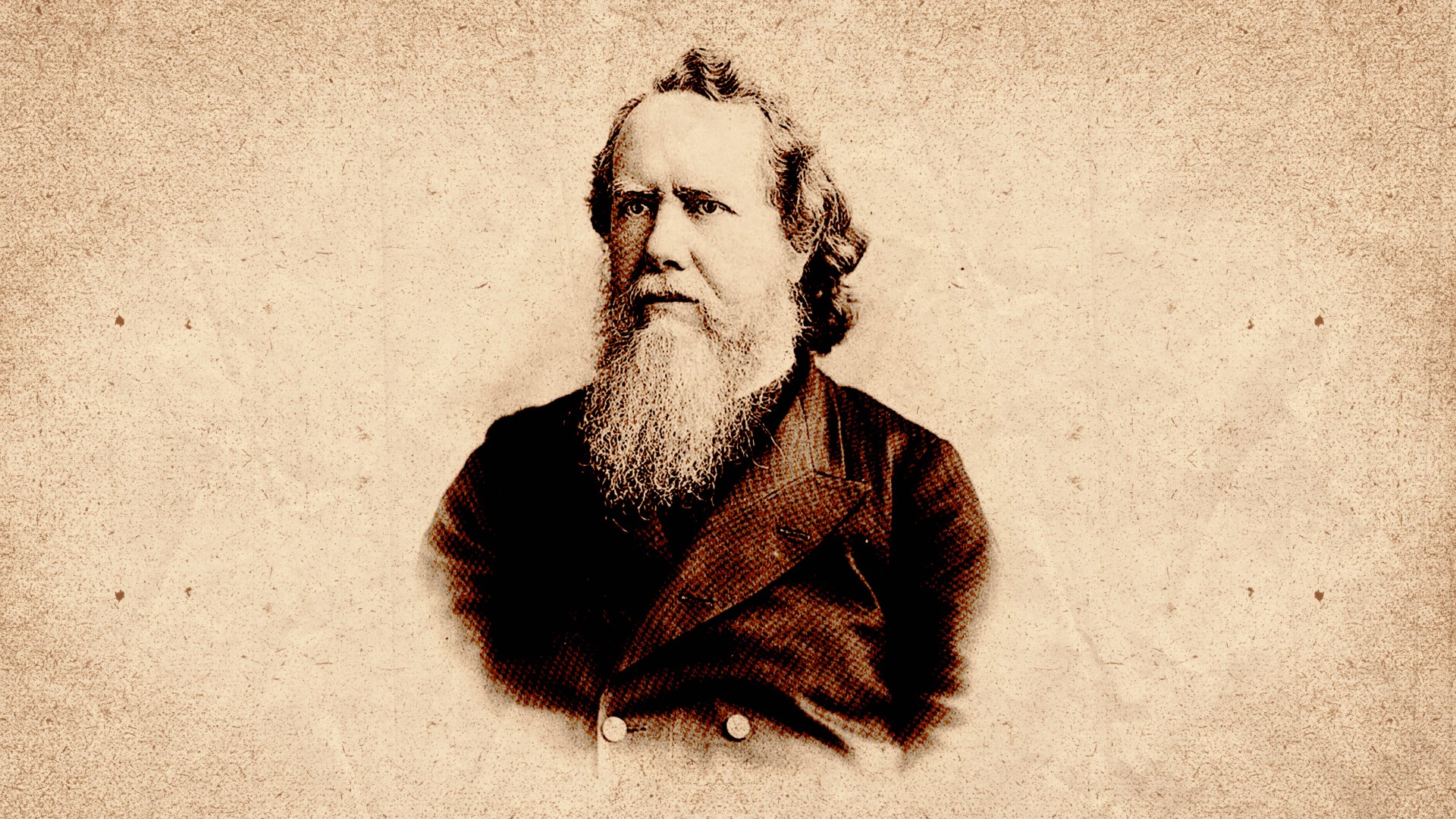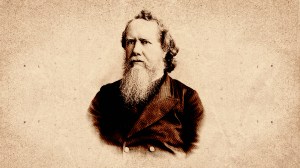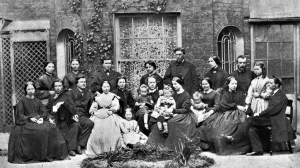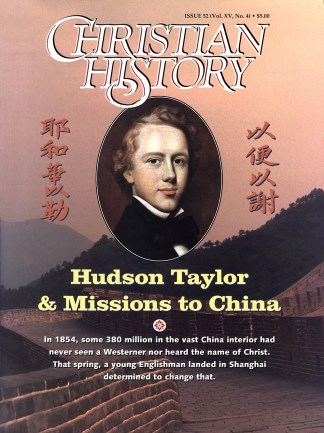In this series
James Taylor was intrigued by all things Chinese. It fascinated him that once-famous empires, like those in Persia, Greece, and Rome, had risen and fallen, but the Chinese Empire remained—the world's greatest monument to ancient times. In the early months of 1832, he knelt beside his 24-year-old wife, Amelia, in the parlor at the back of his busy chemist shop in Barnsley, Yorkshire, England. "Dear God," he prayed, "if you should give us a son, grant that he may work for you in China."
When their child was born on May 21, 1832, James and Amelia called him James Hudson Taylor—Hudson was his mother's maiden name. Immersed in a Methodist family fascinated with China, the young Hudson sometimes blurted out, "When I am a man, I mean to be a missionary and go to China"—though his parents were not to tell him of their prayer for some years.
Yet his faith and life calling were not always clear to him. By age 17, he was in the spiritual doldrums, experiencing, as one biographer put it, "teenage restlessness and rebellion" against his impatient father. He became the anxious prayer concern of his sister and mother, among others, which led to a story that has become a legend in missions circles.
According to Taylor, in June 1849, when he was 17, his mother locked herself in a room 50 miles from home. She was visiting her sister at the time, and she had felt moved not only to pray that Taylor would become a Christian but to stay in the room until she was sure her prayers had been answered. That same afternoon, Taylor later recalled, he picked up a gospel tract about the finished work of Christ and accepted "this Savior and this salvation."
Such "coincidences" were to attend the rest of Taylor's life—a single-minded, even strong-headed life completely dedicated to one thing: bringing the gospel to the interior of China.
Chinese dressing
Within a few months of this "new birth," as he called it, Taylor's call to China was confirmed during a night of intense prayer when Taylor lay stretched "before Him with unspeakable awe and unspeakable joy." He spent the next few years in frantic preparation, medical and language studies, and a deeper immersion into the Bible and prayer.
Finally, on Monday, September 19, 1853, the little three-masted clipper Dumfries, weighing less than 500 tons, slipped quietly out of Liverpool harbor with Taylor aboard headed for China. Just 21 years old, he said an emotional good-bye to his mother.
For Taylor life had become an adventure of faith, of learning to trust God in impossible circumstances. The first leg of this journey only reinforced the pattern.
Off the Welsh coast, the ship ran into a severe storm that lasted for hours. The captain described the sea as the "wildest he had ever seen." Taylor alternated between dread and trust in God's care. When the captain, a devout Methodist himself, grew convinced that they weren't going to survive a half-hour longer, he turned to Taylor and asked, "What of your call to labor for the Lord in China?"
Taylor said that he wouldn't wish to be in any other position and that he still expected to reach China. But if not, "The Master would say it was well that I was found seeking to obey his command."
In fact they did survive the storm, and in March 1854, the ship arrived in Shanghai, one of the five "treaty ports." The 1842 Treaty of Nanking (Nanjing), ending the first Opium War between England and China, had opened these trading links with the West, giving foreigners the right to live only in these cities. Taylor quickly settled in and began his work as an agent of the Chinese Evangelization Society, a fledgling independent missionary organization started under the inspiration of pioneer missionary Karl Gützlaff. A local teacher taught Taylor the Mandarin dialect, variations of which were used all over China.
That same year he made a radical decision for which he received both derision and praise: he decided to dress in Chinese clothes and grow a pigtail.
His decision was rooted in his deep respect for Chinese culture and his view of the missionary's role. When incredulous fellow Protestant missionaries, who all wore western dress, criticized him for this unbecoming behavior, he pointed out that those who knew the Chinese best came to appreciate their customs. Many Chinese objected to Christianity, he argued, because it seemed to be a foreign religion that tended to mold converts in the ways of Western nations. Taylor, like the Roman Catholic missionaries who for decades had adopted Chinese dress, was ahead of his time.
First steps inland
The early years presented surprises to the young Taylor. Many Europeans lived in luxury in Shanghai, and Taylor thought some missionaries were "worldly." Yet they were in great demand with government officials as interpreters. The general atmosphere of hearty sociability came as something of a shock to the child of a strict Methodist.
Furthermore, money quickly became a sore point. Whereas Church Missionary Society single men received the equivalent of $700 a year, not including rent, he was given a salary of only $80 a year, which was also supposed to cover rent.
Still, Taylor pressed on to get the gospel to the Chinese in the interior who had never heard it. China was composed of 18 provinces, of which only seven had missionaries, and even then, they tended to work in only a few coastal cities. Taylor carped about missionaries who confined themselves to the relative comfort of urban life. He worried about the countless unreached souls of inland China and immediately set about trying to reach them.
In December 1854, within nine months of his arrival, Taylor and Joseph Edkins hoisted sail, and with bags of Chinese Bibles and tracts over their shoulders, visited hamlets along the banks of the Huangpu River. At Songjiang, the extraordinary appearance of two foreigners drew crowds, who at one point made sport of the two men, mocking them and threateningly backing them down a street that ended at the river. Taylor and Edkins barely escaped (hopping onto a passing boat) and continued their 200-mile, round-trip journey. Taylor soon made other trips to the interior, eventually using the city of Ningpo (Ningbo), home to a number of mission organizations, as his base.
The Chinese Evangelization Society proved to be well-intentioned but increasingly incompetent; it failed to pay its missionaries in a timely manner and often sent missionaries unprepared for their work. After much prayer and wrestling, Taylor resigned from its service in 1857. He didn't know exactly how his work would be financed, though he decided he would not ask for donations—nor even let friends and relatives know of his needs. He would simply trust God to supply him.
Taylor also had for some time been seeking a wife. He had been rejected by two women in England, one before and one after he left for China, leaving him deeply lonely. But in 1857, he met and immediately fell in love with 20-year-old Maria Dyer, the much-sought-after daughter of prestigious (though deceased) missionary parents. Despite snobbish and fierce opposition from some in the Ningpo missionary establishment (Taylor's Chinese dress and lack of sophistication put them off), the young couple married in January 1858. It was an uncommonly happy marriage partly because they shared a deep passion to evangelize China even at great personal sacrifice.
Taylor continued to pour himself into his work, both treating the sick and preaching, and by March 1860, Taylor's church on Bridge Street, Ningpo, had grown to 21 members. But by the summer of 1861, he had contracted some disease (probably hepatitis) that completely sapped his strength. After seven years of ministry in China, he was forced to return to England for an extended period of recovery.
Seeking the impossible
Though he was supposed to rest in England, he continued his furious work pace, translating the Bible, recruiting missionaries, and obtaining a qualification in midwifery.
Taylor was troubled in England by the lack of interest in China. In 1865, as he paced the floor, he dictated to Maria China: Its Spiritual Need and Claims.
"Can all the Christians of England," he wrote, "sit still with folded arms while these multitudes [in China] are perishing—perishing for lack of knowledge—for lack of that knowledge which England possesses so richly, which has made England what England is and made us what we are? What does the Master teach us? Is it not that if one sheep out of a hundred be lost, we are to leave the ninety and nine and seek that one? But here the proportions are almost reversed, and we stay at home with the one sheep, and take no heed to the ninety and nine perishing ones!"
Taylor became convinced that a special organization was needed for the evangelization of inland China—to go beyond the five treaty ports to which nearly all missionary work had been confined. He was determined not to cut the financial ground from under the feet of the older missionary societies, but what form should such an organization take?
He began making plans for recruiting 24 missionaries: two for each of eleven inland provinces of China that were without a missionary, and two for Mongolia. It was a visionary plan that would have left experienced missionaries breathless: at the time, a host of seasoned missionary organizations had, all told, only some 90 Protestant missionaries in China. Taylor single-handedly wanted to increase that by over 25 percent.
This would be an enormous financial commitment, so Taylor opened a bank account under the name of the China Inland Mission (CIM). Soon he had money and five missionary volunteers to send to China—even before he had formally committed himself to head a new missions society.
He hesitated to take that step because he found himself wracked with doubt. For months in 1865, a myriad of concerns raced through his mind; he rarely slept for two hours at a time, sometimes not at all. On the one hand, he agonized over the millions of Chinese who were dying without the hope of the gospel; on the other hand, he wrestled with what he called his "unbelief": he feared taking responsibility for sending young men and women into the China interior, where they would be subject to rejection, illness, and persecution—all of which he knew about first hand.
Taylor thought he might be on the verge of a nervous breakdown: he wrote in his diary later, "For two or three months, intense conflict . …Thought I should lose my mind." A friend, seeing that Taylor desperately needed a break, invited him to Brighton on the south coast of England for the weekend of June 24-26.
On Sunday morning, he slipped out after worship: "Unable to bear the sight of a congregation of a thousand or more Christian people rejoicing in their own security while millions were perishing for lack of knowledge," he later recalled, "I wandered out on the sands alone, in great spiritual agony."
Some time during that walk, he found relief. "There the Lord conquered my unbelief, and I surrendered myself to God for this service. I told him that all responsibility as to the issues and consequences must rest with him; that as his servant it was mine to obey and to follow him—his to direct, to care for, and to guide me and those who might labor with me . …"
With that, he felt his halting steps had been confirmed. Immediately he wrote in the margin of his Bible, "Prayed for 24 willing, skillful laborers, Brighton, June 25/65."
Taylor was determined that the CIM would have six distinctive features. First, its missionaries would be drawn from any denomination-provided they could sign a simple doctrinal declaration.
Second, they would have no guaranteed salary but trust in the Lord to supply their needs. Income would be shared. No debts would be incurred.
Third, no appeals for funds would be made.
Fourth, the work abroad would be directed not by home committees but by himself and eventually other leaders on the spot in China.
Fifth, the organization would press to the interior of China ("where Christ had not been named").
Sixth, the missionaries would wear Chinese clothes and worship in Chinese-styled buildings.
Challenges to the vision
Within a year, a two-year-old clipper, the Lammermuir, sailed out of the East India dock in London bound for China. Aboard, with Hudson and Maria Taylor and their four children, were 16 young missionaries, six men and ten women, who looked forward to joining the four men and one woman already working under Taylor's direction as cim missionaries in China.
In the inland towns of Hangchow (Hangzhou) and Hsiaoshan (Xiao-shan), the CIM began its work, a combination of medical care and evangelistic preaching amidst the hustle and bustle of Chinese life. CIM missionary John McCarthy, from Dublin, described the scene that greeted him when he arrived in Hangzhou in 1867. It was the Chinese New Year holiday, and a crowd hovered outside the CIM clinic. Sedan chairs lined up dropping off patients and waiting to be hired for the return journey. Food and drink vendors had moved in and were doing a good trade. In the midst of the seeming confusion, Taylor stood on a table preaching to the people. As McCarthy and his family were shown into the CIM house, Taylor waved his hand and acknowledged them with a brief word of welcome and then carried on preaching.
Taylor was seeing more than 200 patients daily. His operations to remove cataracts seemed like miracles to the Chinese. One convert, Mr. Tsiu, who had been converted under Taylor's preaching in Ningpo, also preached to those who waited for medical treatment.
The visionary and indefatigable Taylor made enormous demands on himself, and as one would expect, equally high demands on CIM missionaries, and some of them balked.
One of his missionaries, Lewis Nicol, visited Church Missionary Society (CMS) missionaries and grumbled about things he thought were wrong at New Lane (CIM headquarters). He soon abandoned his Chinese dress, claiming that English clothes gave him more protection and respect. "I will not be bound neck and heel to any man," he told Taylor. After nearly two years of unpleasantness, Taylor dismissed Nicol from the mission, mainly for spreading lies about the CIM. Three CIM missionaries resigned in sympathy with Nicol.
Around the same time, two cms missionaries complained that it was dangerous for so many unmarried men and women to live together at New Lane and that Taylor was too familiar with the young ladies (he and Maria kissed some of them on the forehead before they went off to bed). The ladies themselves denied any inappropriate behavior on Taylor's part, but still the complaint reached London and for a while led to a fall in support for the mission. For appearance' sake, Taylor ended the kissing, but he refused to stop directly supervising single women.
Then Timothy Richard, an able young Welsh Baptist who arrived in China in 1870, began to win over some members of the CIM, particularly those who lived in the Shansi (Shanxi) area. Richard emphasized establishing the Kingdom of God on earth and protecting the poor and needy from tyranny. He also argued that God worked through other religions such as Confucianism, Buddhism, and Taoism; if their similarities to Christianity could be pointed out, he believed, then followers could be won over to Christ, and thus, the whole life of China would eventually undergo a thorough Christian transformation. A handful of CIM missionaries were influenced by Richard's more liberal views, and they left the mission.
In spite of controversy, the number of CIM missionaries grew. By 1876, 18 new missionaries set sail for China, bringing the total to 52, making CIM a fifth of the total missionary force in China. CIM missionaries moved increasingly into the interior provinces: to Honan (Henan), Shensi (Shaanxi), Kansu (Gansu), Hunan, Kweichow (Guizhou), and at least one brave soul reached Tibet.
Taylor made another bold move, for which other mission societies criticized him: he began sending unmarried women into the interior, a testimony to the courage of these women.
Taylor's boldness seemed to know no bounds. In 1881 he had the temerity to ask for another 70 missionaries by the close of 1884-and he got 76. Late in 1886, Taylor was praying for another hundred missionaries by 1887. A veteran missionary told Taylor, "I am delighted to hear that you are praying for large reinforcements. You will not get a hundred, of course, within the year, but you will get many more than if you did not ask for them."
"Thank you for your interest," Taylor replied. "We have the joy of knowing our prayers answered now. And I feel sure that, if spared, you will share the joy of welcoming the last of the hundred to China!" By early November 1887, Taylor announced that 102 candidates had been accepted for service and that enough money had been given to pay for their passages to China!
Many of the early missionaries of the CIM had little formal education, but a number were university graduates. Some arrived idealistic and enthusiastic but mentally and spiritually unprepared for the rigor of interior mission work. Some were arrogant and insensitive to Chinese culture. Some found that once on the scene, they didn't care for Taylor's leadership or CIM's high ideals. Some wilted under the pressure of sustaining a living and assimilating a new culture while trying to spread the gospel. Indeed, the toll on human health was great, but the mission remained true to its purpose and eventually became the largest missionary organization in China, and even more important to Taylor, with a Christian presence in all 18 provinces of China.
Setbacks and heartaches
Whether in China or back in England, Taylor faced a relentless round of speaking engagements, personal visits, correspondence, and administrative tasks. Still he greeted each sunrise with prayer, and he often worked late into the night, catching sleep day or night when his body demanded it.
Unforeseen events of local history often slowed the work. Members of the mission, including Taylor's family, were injured in an anti-foreigner riot that attacked the CIM house in Yangchow (Yangzhou) in 1868. When the news reached London, the House of Lords began debating whether allowing missionaries into the China interior was good for British trade.
Rivalry between the London and China councils of the CIM , which Taylor had established to run the mission, caused him enormous strain for a time and led to the resignation of nearly 30 missionaries. The issue was this: Taylor wanted the China Council, as closest to the work, to have executive powers; the London Council disagreed.
William Sharp of the London Council thought Taylor was dictatorial and ought to have his powers severely clipped. He told Taylor, "When it doesn't accord with your views, you try to force your council to fall in with your views. I could wish you were led to let the mission get on by itself while you concentrated on expounding the Scriptures and stirring up the churches."
Taylor could be demanding and seemingly autocratic, but in Taylor's mind, he was merely anxious to protect the integrity of his mission. Writing to London about new recruits, he said, "I only desire the help of such persons as are fully prepared to work in the interior [of China], in the native costume, and living, as far as possible, in the native style. I do not contemplate assisting, in the future, any who may cease to labor in this way. China is open to all, but my time and strength are too short, and the work too great to allow of my attempting to work with any who do not agree with me in the main on my plans of action."
As a man who had literally given all to Christ in China, he found it difficult to expect any less commitment from others: "China is not to be won for Christ by quiet, ease- loving men and women. … The stamp of men and women we need is such as will put Jesus, China, souls, first and foremost in everything and at every time-even life itself must be secondary."
In spite of his self-confessed periods of irritation and impatience, he could show forbearance and flexibility. It was only after two years of defiance that he reluctantly dismissed Lewis Nicol, and at times he even waived some of the mission's rules (like the prohibition against single female missionaries marrying) to respond to local circumstances.
Perhaps the most remarkable aspect of his work was that he managed to continue it in spite of constant poor health and regular bouts with depression. On a speaking tour of the United States in 1900, Taylor nearly had a complete physical and mental breakdown. As his wife, Maria, had noted decades earlier, "I am more intimately acquainted than anyone else can be with his trials, his temptations, his conflicts, his failures and failings, and his conquests."
The personal cost was often high indeed: Maria died at age 33, and four of Maria's eight children died before they reached the age of 10. (Taylor eventually married Jennie Faulding, another CIM missionary.) Even more devastating to the mission: while Taylor was convalescing in Switzerland in the summer of 1900, the Boxer Rebellion spread through China, murdering 58 CIM missionaries and 21 of their children.
The world catches on
By the late 1880s, Taylor's vision had begun to ignite imaginations all across the world. In 1888 Taylor visited Canada, and wherever he preached, young people offered themselves as missionaries to China. Taylor had been opposed to the idea of establishing a branch of the CIM in North America but grew convinced that it was God's will. By the time his visit was finished, over 40 men and women applied to join the CIM.
By the end of his life, the very mission organizations that had scoffed at his methods had begun adopting many of them.
Just after Taylor died, a young Chinese evangelist looked upon his body and summed up Taylor's most important legacy: "Dear and venerable pastor, we too are your little children. You opened for us the road to heaven. We do not want to bring you back, but we will follow you."
Roger Steer is a free-lance writer living in Devon, England. He is author of J. Hudson Taylor: A Man in Christ (OMF, 1990).
Copyright © 1996 by the author or Christianity Today/Christian History magazine. Click here for reprint information on Christian History.














